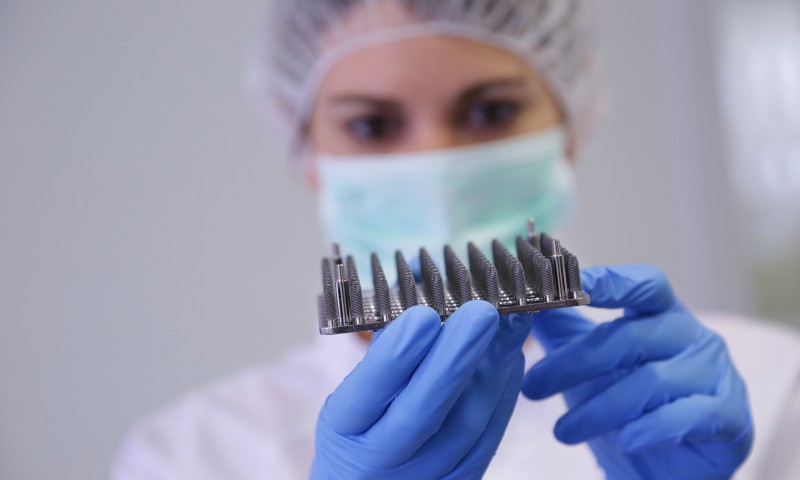

Throughout its history, AVINENT has played a proactive role in developing a network of scientific and academic partnerships through collaboration with experts, universities and advanced research centers across Spain. By promoting and backing research, the firm seeks to support scholars and scientists, thereby opening up new horizons and lines of research within the industry.
Furthermore, by contributing its know-how in digital dentistry and implantology, AVINENT brings a solid foundation of proven excellence to new scientific studies that focus on improving existing clinical and prosthetic techniques for example, while also investigating new ones. AVINENT therefore continues to position itself as a company that sets the standard in R&D within the industry.
New studies, new horizons
AVINENT is currently collaborating on studies at several leading research universities in Spain. Dr. Carmen Álvarez, a tenured lecturer in the Department of Pharmacology, Pharmacy and Pharmaceutical Technology at the University of Santiago de Compostela (USC), is one of the experts who, with AVINENT’s support, is researching into new possibilities within the industry. She explains that, “for some years now, our group has been working on the functionalization of implant medical devices to improve their biocompatibility and reduce the risk of infection. As we were aware of AVINENT’s high technological capabilities, we approached the company about the possibility of it working as a body to promote and observe some of our projects”.


Another scholar associated with AVINENT is Dr. Guillermo Pradíes Ramiro, director of the Department of Bucofacial Prosthesis and director of the Master’s Degree in Restorative Dentistry using New Technologies at the Complutense University of Madrid (UCM). With AVINENT’s support, Dr. Pradíes and his team have completed a clinical study that has been accepted by the prestigious journal JOMI for publication very soon. The clinical study makes a comparison between the optical properties, from an esthetic viewpoint, of the CAD/CAM customized abutments for prostheses on implants made from different materials, on which lithium disilicate crowns are placed. Dr. Pradíes tells us that “the conclusions drawn from the study show that only the zirconium oxide abutment achieves adequate results in cases where esthetic requirements are high, especially in respect of the gum associated with the implant”.
AVINENT also works proactively with Dr. Gaskon Ibarretxe, a lecturer at the University of the Basque Country (UPV/EHU). Dr. Ibarretxe and his team are conducting a study on cellular level osteogenesis on biomimetic titanium surfaces combined with blood plasma compounds. Although the study has yet to be completed, he explains that “the preliminary results have shown an interesting effect that promotes osteoinduction on the titanium Biomimetic Advanced Surface (BAS) present on AVINENT implants”.
Finally, one of the centers closely associated with AVINENT is the University of Barcelona (UB), which is working with the firm in three different fields. Dr. Rui Figueiredo is an adjunct lecturer in oral surgery, the coordinator of the Master’s Degree in Oral Surgery and Bucofacial Implantology and a researcher at the Bellvitge Biomedical Research Institute (IDIBELL). Dr. Figueiredo tells us that the first study focuses on the problem of peri-implantitis, which affects around 15% of patients: “We have found that some treatments change the surface of the implants, making them less susceptible to bacterial colonization.” The second study, conducted in conjunction with AVINENT’s R&D Department, focuses on the development of trials “to check whether the implantoplasty technique affects the properties and mechanical resistance of the implants”. Lastly, a third study analyses the long-term peri-implant bone levels of the different AVINENT implant connections.

Collaboration between universities and industry, a key formula for the sector’s development
Active collaboration with communities of experts and scholars is positive for both AVINENT and the centers that the firm supports, who express their satisfaction with this cooperation in many different ways. Dr. Carmen Álvarez, who thinks that this relationship could lead to highly significant synergies, says that “we believe that it is fundamental for research centers to be aware of the real needs of the industry in order to find solutions”. Dr. Ibarretxe is also a strong supporter of university-industry collaboration: “It is fundamental to build bridges between the world of clinical care and basic biomedical science to develop high value-added healthcare products.”
Dr. Guillermo Pradíes adds that basic and applied research at universities currently has very limited funding, so collaboration with companies like AVINENT is indispensable. This is something that Dr. Rui Figueiredo also underscores: “It is very hard to get public funding.”


Dr. Pradíes notes that “in order to move forward, universities and industry cannot do without each other”. He also highlights that collaborations of this nature result in a better reputation for the centers: “Our faculty of dentistry is now 33rd in the Top 50 of the World University Ranking, which is due in part to agreements of this type.”
Dr. Figueiredo concludes by saying that “this is an inseparable partnership. We contribute our experience of research and AVINENT brings its knowledge of the industry. In 10 to 20 years’ time, collaborations of this type will put dentistry on a whole new level”.